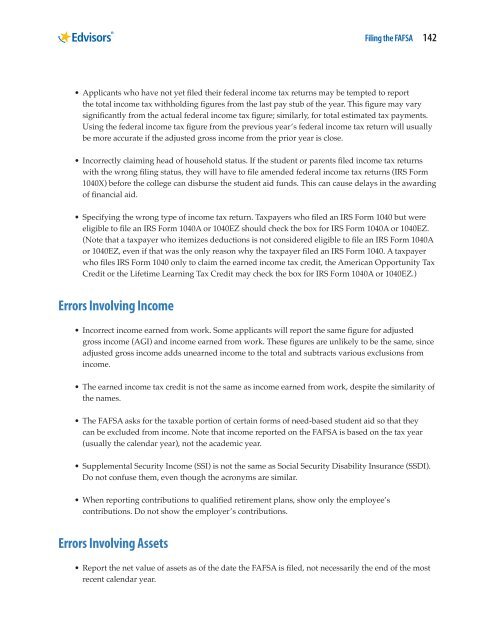filing-the-fafsa-2015-2016-edition
filing-the-fafsa-2015-2016-edition
filing-the-fafsa-2015-2016-edition
Create successful ePaper yourself
Turn your PDF publications into a flip-book with our unique Google optimized e-Paper software.
Filing <strong>the</strong> FAFSA 142<br />
• Applicants who have not yet filed <strong>the</strong>ir federal income tax returns may be tempted to report<br />
<strong>the</strong> total income tax withholding figures from <strong>the</strong> last pay stub of <strong>the</strong> year. This figure may vary<br />
significantly from <strong>the</strong> actual federal income tax figure; similarly, for total estimated tax payments.<br />
Using <strong>the</strong> federal income tax figure from <strong>the</strong> previous year’s federal income tax return will usually<br />
be more accurate if <strong>the</strong> adjusted gross income from <strong>the</strong> prior year is close.<br />
• Incorrectly claiming head of household status. If <strong>the</strong> student or parents filed income tax returns<br />
with <strong>the</strong> wrong <strong>filing</strong> status, <strong>the</strong>y will have to file amended federal income tax returns (IRS Form<br />
1040X) before <strong>the</strong> college can disburse <strong>the</strong> student aid funds. This can cause delays in <strong>the</strong> awarding<br />
of financial aid.<br />
• Specifying <strong>the</strong> wrong type of income tax return. Taxpayers who filed an IRS Form 1040 but were<br />
eligible to file an IRS Form 1040A or 1040EZ should check <strong>the</strong> box for IRS Form 1040A or 1040EZ.<br />
(Note that a taxpayer who itemizes deductions is not considered eligible to file an IRS Form 1040A<br />
or 1040EZ, even if that was <strong>the</strong> only reason why <strong>the</strong> taxpayer filed an IRS Form 1040. A taxpayer<br />
who files IRS Form 1040 only to claim <strong>the</strong> earned income tax credit, <strong>the</strong> American Opportunity Tax<br />
Credit or <strong>the</strong> Lifetime Learning Tax Credit may check <strong>the</strong> box for IRS Form 1040A or 1040EZ.)<br />
Errors Involving Income<br />
• Incorrect income earned from work. Some applicants will report <strong>the</strong> same figure for adjusted<br />
gross income (AGI) and income earned from work. These figures are unlikely to be <strong>the</strong> same, since<br />
adjusted gross income adds unearned income to <strong>the</strong> total and subtracts various exclusions from<br />
income.<br />
• The earned income tax credit is not <strong>the</strong> same as income earned from work, despite <strong>the</strong> similarity of<br />
<strong>the</strong> names.<br />
• The FAFSA asks for <strong>the</strong> taxable portion of certain forms of need-based student aid so that <strong>the</strong>y<br />
can be excluded from income. Note that income reported on <strong>the</strong> FAFSA is based on <strong>the</strong> tax year<br />
(usually <strong>the</strong> calendar year), not <strong>the</strong> academic year.<br />
• Supplemental Security Income (SSI) is not <strong>the</strong> same as Social Security Disability Insurance (SSDI).<br />
Do not confuse <strong>the</strong>m, even though <strong>the</strong> acronyms are similar.<br />
• When reporting contributions to qualified retirement plans, show only <strong>the</strong> employee’s<br />
contributions. Do not show <strong>the</strong> employer’s contributions.<br />
Errors Involving Assets<br />
• Report <strong>the</strong> net value of assets as of <strong>the</strong> date <strong>the</strong> FAFSA is filed, not necessarily <strong>the</strong> end of <strong>the</strong> most<br />
recent calendar year.


